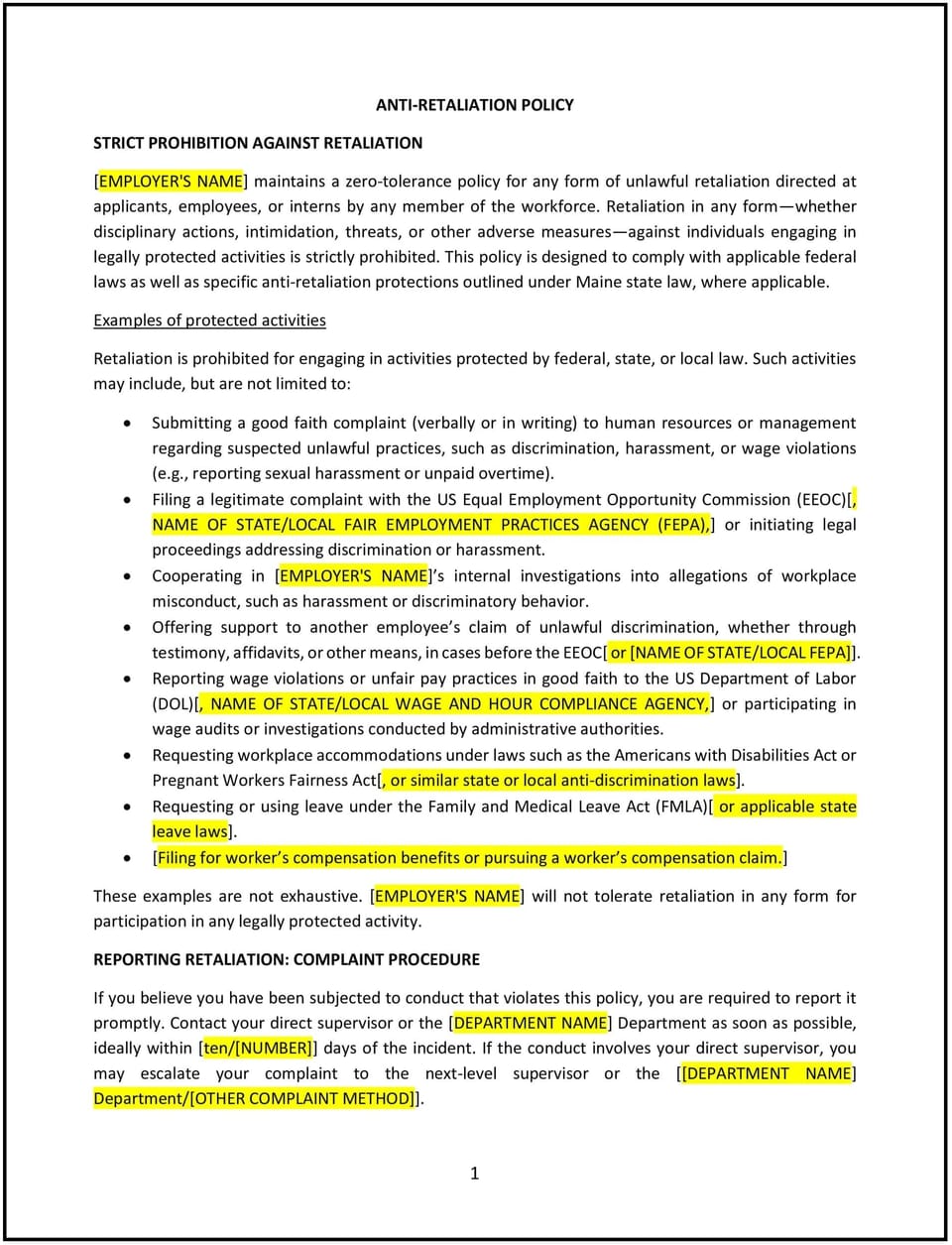Anti-retaliation policy (Maine): Free template

Anti-retaliation policy (Maine): Free template
This anti-retaliation policy is designed to help Maine businesses create a workplace culture that protects employees who report misconduct or participate in investigations. It provides clear guidelines to prevent retaliation, ensuring employees feel safe to raise concerns and businesses can address issues effectively while maintaining compliance with state and federal laws.
By implementing this policy, Maine businesses can promote trust, encourage transparency, and minimize risks related to retaliation claims.
How to use this anti-retaliation policy (Maine)
- Define retaliation: Clearly explain what constitutes retaliation, such as adverse actions taken against employees for reporting misconduct or participating in investigations.
- Establish reporting procedures: Provide businesses with steps for employees to report suspected retaliation, including confidential reporting options.
- Designate responsibility: Identify the managers or departments responsible for handling retaliation claims, such as HR or compliance teams.
- Outline investigation protocols: Include a process for investigating retaliation claims, with timelines and confidentiality safeguards.
- Clarify consequences: State the disciplinary actions businesses should take if retaliation occurs, including termination if necessary.
- Educate employees: Emphasize the importance of anti-retaliation principles during onboarding and through regular training sessions.
- Monitor implementation: Recommend periodic reviews to ensure anti-retaliation measures are followed.
- Align with legal standards: Highlight the need for businesses to stay updated on Maine and federal laws regarding retaliation.
Benefits of using this anti-retaliation policy (Maine)
Implementing this policy provides several advantages for Maine businesses:
- Encourages reporting: Creates an environment where employees feel safe reporting concerns or misconduct.
- Builds trust: Demonstrates the company’s commitment to protecting employees from retaliation.
- Mitigates legal risks: Helps businesses comply with Maine and federal anti-retaliation laws, reducing potential penalties.
- Promotes transparency: Establishes clear processes for addressing and preventing retaliation.
- Strengthens company culture: Fosters an ethical workplace by prioritizing accountability and fairness.
Tips for using this anti-retaliation policy (Maine)
- Communicate effectively: Share the policy with employees during onboarding and include it in the employee handbook.
- Train managers: Ensure managers understand how to handle retaliation claims and prevent retaliatory actions.
- Document thoroughly: Keep detailed records of all reports, investigations, and actions taken to demonstrate compliance.
- Foster a safe environment: Encourage open communication so employees feel comfortable raising concerns.
- Review regularly: Update the policy to reflect any changes in Maine or federal laws.
- Seek feedback: Periodically ask employees for input on how to improve anti-retaliation practices.
Q: What constitutes retaliation under this policy?
A: Retaliation includes adverse actions such as demotion, termination, or harassment against employees who report misconduct or participate in investigations.
Q: How can businesses encourage reporting without fear of retaliation?
A: Businesses should establish confidential reporting mechanisms, emphasize their anti-retaliation stance during training, and ensure managers understand the importance of compliance.
Q: What steps should businesses take when a retaliation claim is reported?
A: Businesses should promptly investigate the claim, ensure confidentiality, and take appropriate disciplinary action if retaliation is confirmed.
Q: How can businesses train managers to prevent retaliation?
A: Training should cover examples of retaliation, proper responses to employee concerns, and the importance of maintaining compliance with anti-retaliation laws.
Q: Are businesses required to document reports and investigations?
A: Yes, maintaining thorough records helps demonstrate compliance and ensures transparency in handling retaliation claims.
Q: How often should the anti-retaliation policy be reviewed?
A: The policy should be reviewed annually or whenever there are changes in Maine laws or workplace operations.
Q: What are the legal consequences for businesses that fail to prevent retaliation?
A: Non-compliance can lead to legal claims, financial penalties, and damage to the business’s reputation.
This article contains general legal information and does not contain legal advice. Cobrief is not a law firm or a substitute for an attorney or law firm. The law is complex and changes often. For legal advice, please ask a lawyer.


